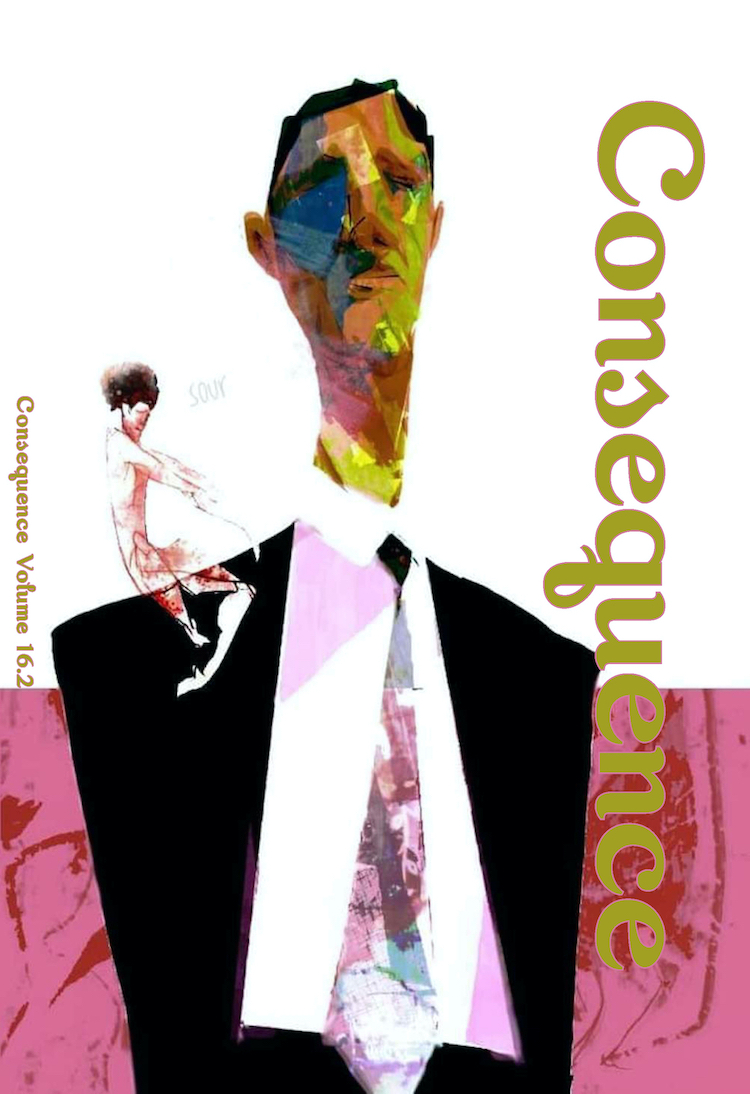You’ve just received over 15% off your copy of Conseqeunce Volume 16.2
What You’ll Find Inside
BIPOC Contributors
(turn over)Forty-one pieces of poetry, fiction, nonfiction, translations, and visual art from contributors who identify as part of the BIPOC community
Global Content
(turn over)Work engaging with the realities of and experiences from conflicts in Iran, Palestine, Israel, Peru, Nigeria, the Philippines, Armenia, Turkey, India, the US, Canada, China, Sri Lanka, and more.
Compelling Individual Pieces
(turn over)~Poetry using an immigration form as a framing device
~A personal essay exploring one’s tumultuous cultural past through food
~Fiction about an adolescent who struggles to deal with his dad’s return from service
What our readers are saying
How You Contribute to Our Mission
- Reaching and providing a platform to underrepresented people such as Vets and refugees who are part of the BIPOC or LGBTQ+ communities
- Giving voice to lesser-known conflicts and geopolitical issues from around the globe
- Helping us continue our public-facing events and our immersive creative and professional workshops
- Enabling vital efforts such as the Young Writers and Artists Project, which encourages younger writers and artists to engage in their experiences related to our themes
FAQs
What does writing about war mean?
For us, writing about war means exploring it beyond the expected images of battle or dry political analyses. We delve into the lived realities and aftereffects of conflict, as shared by individuals with unique stories that bring depth, humanity, and unexpected perspectives. From personal anecdotes to surprising cultural connections, we aim to foster a nuanced, global understanding of war and its consequences, inviting readers into a broader, more complex view of these themes.
How does Consequence reshape how we understand war and geopolitical conflict?
Consequence reshapes our understanding of war and geopolitical conflict by moving beyond typical, sometimes detached narratives of violence, offering instead deeply personal explorations. Through stories from diverse perspectives, we highlight how war’s impact reaches into everyday moments. For instance, a past contributor shared a vivid memory of eating pistachio booza in Palestine’s West Bank. This seemingly simple act becomes a touchpoint for the quiet resilience of life in conflict zones and heavily militarized borders. By zooming in on such individual experiences, Consequence cultivates a more humanized, multifaceted view of conflict and its far-reaching consequences.
Is there any connection between love and war?
Yes, there can be a profound connection between love and war. One example comes from a past contributor who, while working with an NGO in rural Cambodia, grew close to a Cambodian woman involved in the same humanitarian efforts. Their budding romance was haunted by her inherited trauma from the Cambodian Civil War, which complicated their connection in ways neither anticipated. This story illustrates how war’s emotional scars can span generations, influencing even the most personal aspects of life, like love.
How does Consequence Volume 16.2 support BIPOC writers and voices?
Consequence supports BIPOC writers by offering a platform that amplifies diverse voices from around the globe. Volume 16.2 specifically highlights the work of BIPOC writers and artists with experiences and perspectives that transcend borders. Consequence’s BIPOC Feature showcases stark, courageous storytelling that honors communities whose humanity and creativity endure beyond oppression, offering readers a poignant glimpse into often-overlooked global conflicts.
Letter from the Guest Editor
Dear Readers,
What an honor to peruse and sequence the breadth of brilliant, poignant works in the pages of this volume, Consequence 16.2. The editing team and I agreed this issue’s BIPOC Feature should be borderless and present writers and artists who self-identify as Black, Indigenous, or People of Color from across the globe, not just North America, as diasporas wonderfully outreach regional and continental parameters.
In this installment of Consequence, the voices range valiantly from stark documentation to elaborate styles and structures, though they all share a sincere belief the written word and the visual image can transcend the horror and grief of geopolitical violence. The profound care and the unblinking courage of the writers and artists in this feature are the enduring reflections and testimonies of communities whose humanity and luminosity refuse to be dimmed by empires’ ruthlessness. My deepest thanks go to all those who submitted, read, and edited work for this issue, and my warmest hopes go everywhere this selection of language and images represents.
Sincerely,
Marcus Jackson

